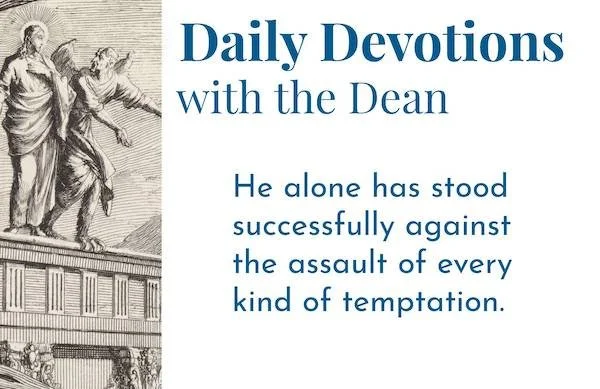Wednesday • 3/4/2026 •
Wednesday of 2 Lent, Year Two
This morning’s Scriptures are: Psalm 72; Genesis 42:18–28; 1 Corinthians 5:9–6:8; Mark 4:1–20
This morning’s Canticles are: following the OT reading, Canticle 11 (“The Third Song of Isaiah,” Isaiah 60:1-3,11a,14c,18-19, BCP, p. 87); following the Epistle reading, Canticle 16 (“The Song of Zechariah,” Luke 1:68-79, BCP, p. 92)
Welcome to Daily Office Devotions, where every Monday through Friday we ask how God might direct our lives from that day’s Scripture readings, as given in the Book of Common Prayer. I’m Reggie Kidd, and I’m grateful to be with you this Wednesday of the second week of Lent. We are in Year 2 of the Daily Office Lectionary.
When I was eleven years old I had enough of a temper problem that my parents arranged for a few after-school sessions with my physical education teacher, Mr. Tilton (many of my outbursts took place during P.E. class — you see, I wasn’t competitive at all!). It was the first time I recall anybody asking me: What is going on inside you? Is what you are doing who you want to be? And just who is it that you do want to be?
It’s hard to say why, but things started to change for the better after that, because somebody cared enough to ask about my heart.
I love Lent. Every year it puts before me those same questions: What is going on inside you? Is what you are doing who you want to be? And just who is it that you do want to be? Only now, it’s not Coach Tilton asking the questions, but God himself via the readings of the Daily Office.
Mark 4: The parable of the sower. When the words of Jesus come to me, do they find welcome in fertile soil, or are they rejected by impenetrable rock? Do his words sink deeply into me and produce verdant life, or sit shallowly and spring up quickly only to wither just as quickly? And do I protect his words from competing undergrowth, or let them get strangled by weeds?
No parable can say everything that could be said. We know that God’s Word carries its own power: it doesn’t return void, it’s sharper than a two-edged sword, it’s made powerful by the Spirit of God (Isaiah 55:11; Hebrews 4:12–13; 1 Thessalonians 1:5). While all that is true, this parable makes a complementary point: it matters what sort of reception I give God’s Word. That is part of the point of a season of: “self-examination and repentance; by prayer, fasting, and self-denial; and by reading and meditating on God’s holy Word” (BCP, p. 265).
1 Corinthians 5–6: To judge or not to judge, that is the question. You don’t spend a lifetime in Christian ministry without being hit with some nasty surprises. Among the worst is finding fellow clergy friends losing their ministries due to adulterous affairs or financial shenanigans or patterns of self-idolizing and narcissistic leadership.
At first blush, Paul’s words about “not associat[ing] with anyone who bears the name of brother or sister who is sexually immoral, etc.,” may seem too “judgy.” I for one, however, am grateful for relationships of mutual accountability. I’m grateful too for the Lenten season’s call to reflect on temptations to immorality, to bad-mouthing others, to greed and acquisitiveness, and to drunkenness and addictive behaviors.
I’m grateful as well for the opportunity Lent presents for repentance of the entitled attitude Paul identifies in 1 Corinthians 6, where believers are suing one another to secure their perceived “rights.” May Lent serve as a persistent call to follow Jesus in preferring rather to be wronged than to wrong, especially regarding brothers and sisters in Christ.
Image: Pixabay
Genesis 42: You have to deal with your guilt. Joseph’s brothers have been carrying their guilt over their mistreatment of him for so long that it colors everything they do. When Pharaoh’s agent in Egypt (who happens to be their brother) lays out harsh conditions for their return home, their immediate thought is that God is punishing them for sins the Egyptian stranger couldn’t even know about: “Alas, we are paying the penalty for what we did to our brother; we saw his anguish when he pleaded with us, but we would not listen. That is why this anguish has come upon us” (Genesis 42:21).
And when they discover on the way home that the money they had brought to purchase grain has been secretly returned to them, they can’t conceive that it might be a gracious gift (which it is!). Instead, they assume God is setting them up so he can bring the hammer of justice down on them: “At this they lost heart and turned trembling to one another, saying, ‘What is this that God has done to us?’” (Genesis 42:28b).
A guilty conscience can radically color the way we perceive everything. Lent creates a special place in the calendar for us to take stock and to come clean with anything that needs to be brought to the Cross and laid at the feet of Jesus. Only then can we know in our hearts the certainty of the truth we affirm in our heads and confess with our lips: “There is now no condemnation for those who are in Christ Jesus” (Romans 8:1).
May we pray deeply and often during this season:
Search me, O God, and know my heart;
test me and know my thoughts.
See if there is any wicked way in me,
and lead me in the way everlasting (Psalm 139:23–24).
Be blessed this day,
Reggie Kidd+













